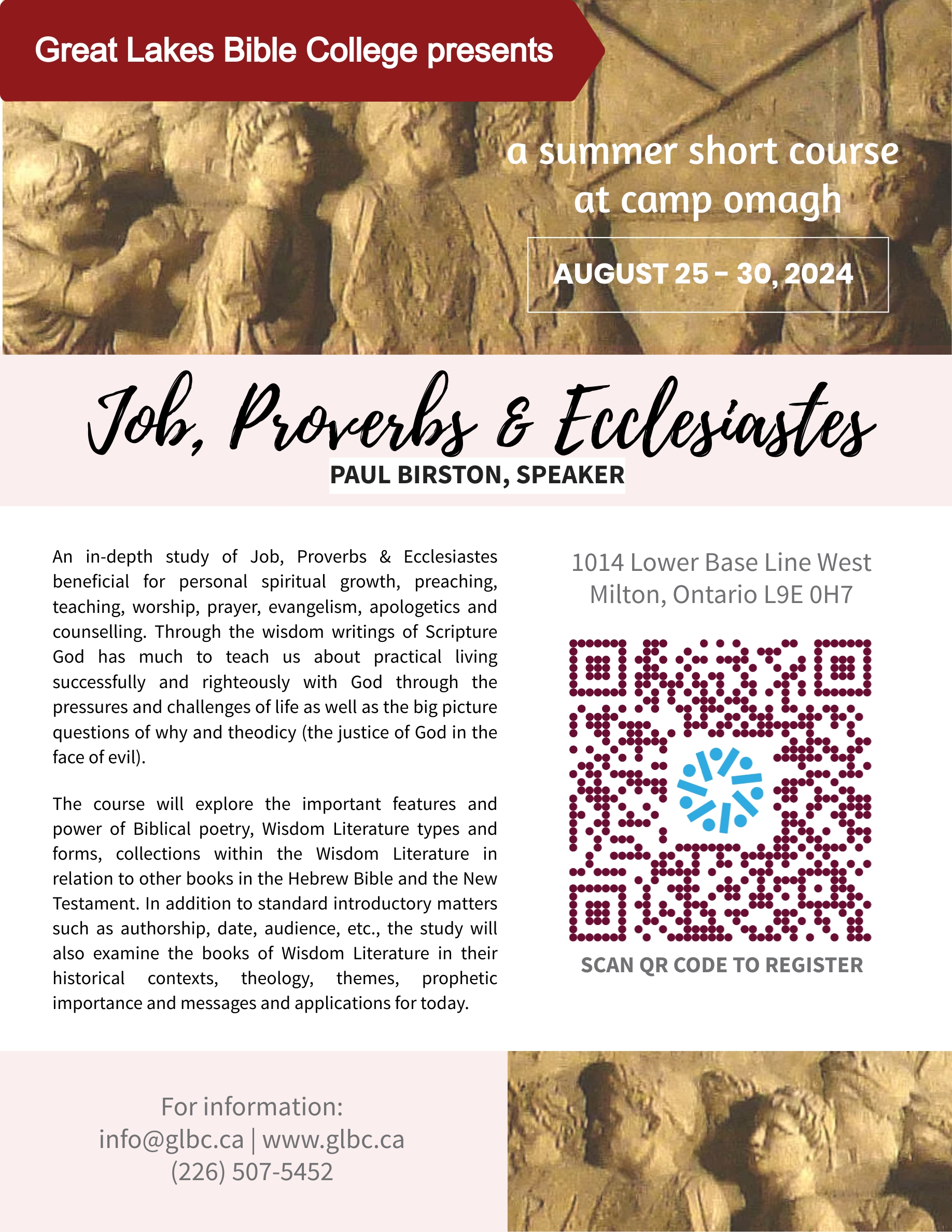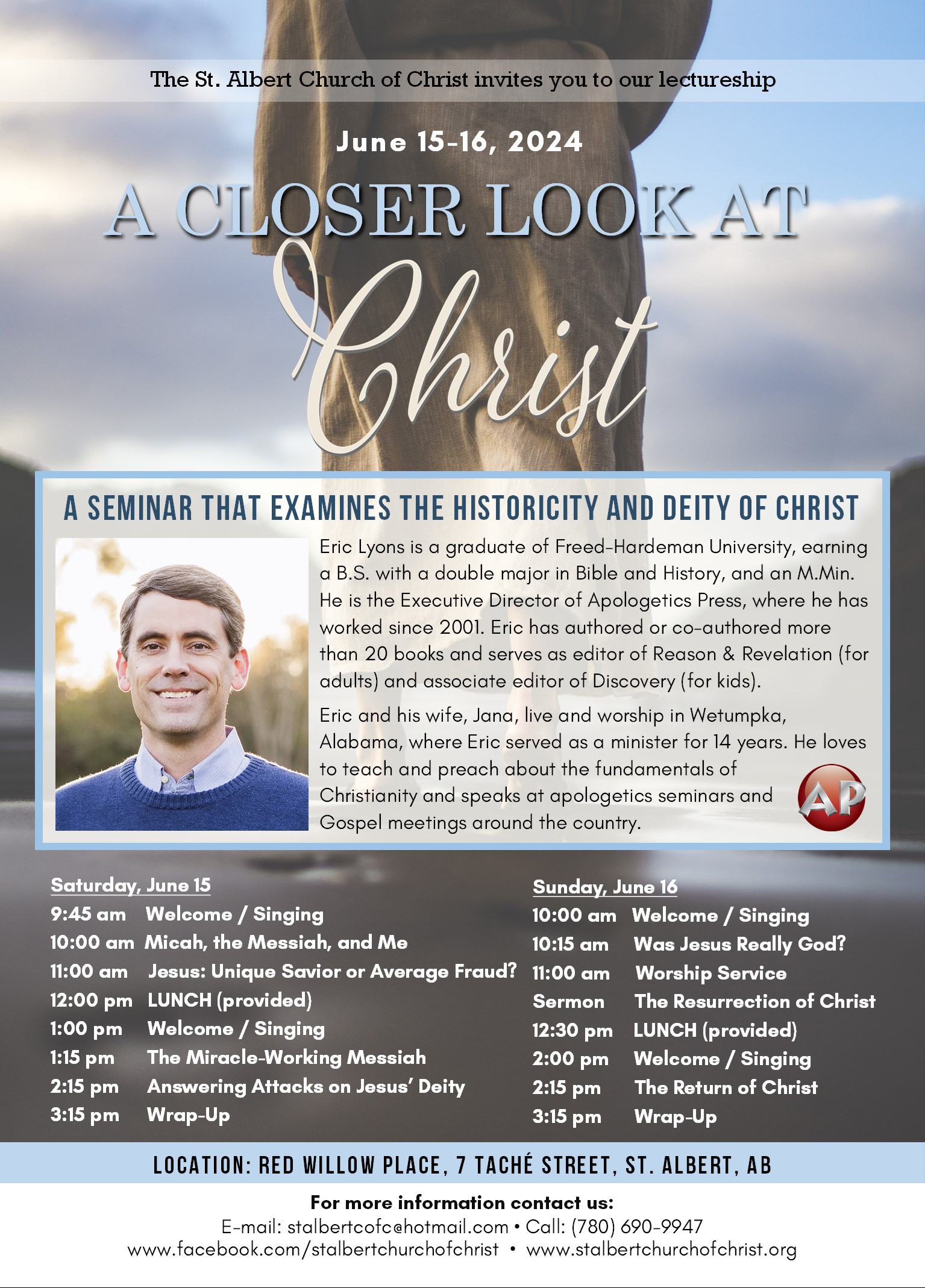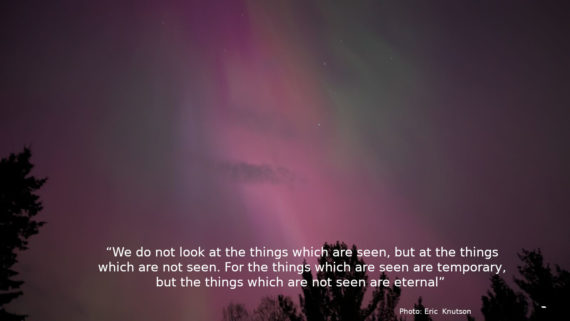2 Corinthians 4:18
“We do not look at the things which are seen, but at the things which are not seen. For the things which are seen are temporary, but the things which are not seen are eternal” (2 Corinthians 4:18).
There is a physical realm and a spiritual realm. Science deals with the physical realm. Religion deals with the spiritual realm.













The physical realm is finite. The universe had a beginning and will have an end. The spiritual realm is not limited by time and space. Christians focus on unseen spiritual realities.
Rationally, if something exists now, something has always existed. According to scientific observation, the physical realm has not always existed. Thus, it must be something spiritual that has always existed.
Intelligence is the most exalted phenomenon we observe. The intelligence of one person is more amazing than any physical object. We experience intelligence. Thus, belief that an intelligent Spiritual Being has always existed, is a rational conclusion in accordance with scientific observations.
Even though whatever has always existed must be something unseen, unseen realities can be known by evidence and testimony. “Now faith is the substance of things hoped for, the evidence of things not seen” (Hebrews 11:1).
Actually most of our knowledge relates to unseen realities known through evidence and testimony. Valid religious knowledge of unseen realities must be based on conclusive evidence and reliable testimony. We know Jesus rose from the dead the same way we know Napoleon lost the Battle of Waterloo – by evidence and testimony.
“By faith we understand that the worlds were framed by the word of God, so that the things which are seen were not made of things which are visible” (Hebrews 11:3).
The Scriptures contain God’s testimony to man about unseen realities.
- “By faith Noah, being divinely warned of things not yet seen, moved with godly fear, prepared an ark for the saving of his household, by which he condemned the world and became heir of the righteousness which is according to faith” (Hebrews 11:7).
- By faith Abraham left Ur to go to a Promised Land he had not seen (Hebrews 11:8–10).
- By faith Moses left Egypt “not fearing the wrath of the king; for he endured as seeing Him who is invisible” (Hebrews 11:27). God Himself is the greatest unseen reality, known by evidence and testimony.
We have not seen God.
Moses was raised by Pharaoh’s daughter and had access to all the wealth of Egypt. Yet, beyond the vanity of visible things, he “saw” the Unseen God:
- “By faith Moses, when he became of age, refused to be called the son of Pharaoh’s daughter, choosing rather to suffer affliction with the people of God than to enjoy the passing pleasures of sin, esteeming the reproach of Christ greater riches than the treasures in Egypt; for he looked to the reward. By faith he forsook Egypt, not fearing the wrath of the king; for he endured as seeing Him who is invisible” (Hebrews 11:24–27).
How could Moses “see” the unseen God?
The same way all men and women of faith through the ages have been cognizant of God’s presence. Not only has God made Himself known, He has shown us what is good. “He has shown you, O man, what is good; and what does the LORD require of you but to do justly, to love mercy, and to walk humbly with your God?” (Micah 6:8).
Paul explains:
- “What may be known of God is manifest in them, for God has shown it to them. For since the creation of the world His invisible attributes are clearly seen, being understood by the things that are made, even His eternal power and Godhead, so that they are without excuse, because, although they knew God, they did not glorify Him as God, nor were thankful” (Romans 1:19-21).
The story is told of an atheist who sneeringly asked a little girl if she believed in God. When she said she did, he said: “I’ll give you a nickel if you can show me where God is.” She replied, “Sir, I’ll give you a dollar if you can show me where God isn’t!”
Although we have not seen God, by means of conclusive evidence and reliable testimony we know that He is Creator of heaven and earth!
We have not seen Christ.
Although we have not seen Christ, by the testimony of those who did, we know that He lived, died for our sins, rose from the dead, and ascended to the Father.
Thomas was skeptical. When the others told him they had seen the risen Lord, he declared: “Unless I see in His hands the print of the nails, and put my finger into the print of the nails, and put my hand into His side, I will not believe” (John 20:25). Upon seeing Jesus, a week later, he exclaimed: “My Lord and my God!” (John 20:28). Jesus said to him: “Thomas, because you have seen Me, you have believed. Blessed are those who have not seen and yet have believed” (John 20:29).
We who have not seen Jesus, know Him through the New Testament writings that contain the testimony of those who saw him. John explains further:
“And truly Jesus did many other signs in the presence of His disciples, which are not written in this book; but these are written that you may believe that Jesus is the Christ, the Son of God, and that believing you may have life in His name” (John 20:30, 31).
We have not seen heavenly Jerusalem.
Abraham was willing to leave Ur to go to a Promised Land he had never seen because he was seeking the heavenly city of God.
“These all died in faith, not having received the promises, but having seen them afar off were assured of them, embraced them and confessed that they were strangers and pilgrims on the earth. For those who say such things declare plainly that they seek a homeland. And truly if they had called to mind that country from which they had come out, they would have had opportunity to return. But now they desire a better, that is, a heavenly country. Therefore God is not ashamed to be called their God, for He has prepared a city for them” (Hebrews 11:13-16).
Christians are not among those “who set their mind on earthly things. For our citizenship is in heaven” (Philippians 3:19b, 20a).
“If then you were raised with Christ, seek those things which are above, where Christ is, sitting at the right hand of God. Set your mind on things above, not on things on the earth” (Colossians 3:1, 2).
“Therefore we do not lose heart. Even though our outward man is perishing, yet the inward man is being renewed day by day. For our light affliction, which is but for a moment, is working for us a far more exceeding and eternal weight of glory, while we do not look at the things which are seen, but at the things which are not seen. For the things which are seen are temporary, but the things which are not seen are eternal” (2 Corinthians 4:16–18). Amen.
Herselt, Belgium

